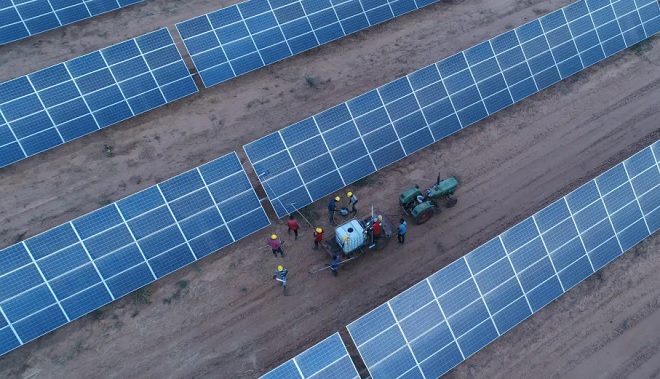The African Development Bank (AfDB) has announced its plans to provide the sum of US$21.51 million in funds for Chad’s clean electricity project. The money raised by numerous development partners will make it possible to boost the capacity for producing clean electricity while also enhancing customer service.
A $19.6 million loan from the African Development Fund makes up the $21.51 million in funding that the African Development Bank (AfDB) announced (ADF). Through the Desert to Power Facility, $1.6 million is being provided by the Green Climate Fund (GCF), while under its Power Africa project, the United States is donating $292,000.
With the help of solar energy, 250 million people in Burkina Faso, Chad, Ethiopia, Eritrea, Djibouti, Mali, Mauritania, Niger, Nigeria, Senegal, and Sudan will be able to access electricity. The funds raised will be used to carry out the Power Sector Support Project (PASET), which the AfDB has chosen to include in its Desert to Power program.
Read also: Senegal Receives €5.01m Digital Technology Park Fund From AfDB
National Electricity Company of Chad (SNE) will hybridise three thermal power facilities with solar power in Bongor (250 km), Bol (300 km), and Biltine (1000 km) as part of Paset. These plants can use fewer fuel due to hybridization.
The AfDB claims that the project will also make it possible to buy and install IT equipment for remote distribution management, connect twelve secondary electricity production centres to enhance the quality of billing and collection, and increase the capacity of SNE and other players in the energy sector, particularly the Electricity Regulatory Authority (ARSE) and the Chadian Ministry of Energy.
SNE intends to install 45,000 prepayment metres in order to decrease non-technical electricity losses in addition to increasing electricity production. The Paset will enhance SNE’s technical, financial, and commercial performance while enabling the establishment of at least 15,000 connections with prepayment metres.
AfDB-Funding Across Africa
An off-grid recovery platform received $20 million from the African Development Bank (AfDB).
The Sustainable Energy Fund for Africa (SEFA), a multi-donor fund run by the African Development Bank, gave $7 million in finance for the expansion of a blended finance project called the Clean Revolution Project (CRP). In addition to increasing access to clean electricity and guaranteeing a green economic recovery, this is done to lessen the negative consequences of the epidemic.
The Global Environment Facility (GEF), an international environmental fund, contributed the remaining $13 million.
The AfDB’s Sustainable Energy Fund for Africa (SEFA) will give Mozambique’s government $2.5 million to help pay for building a floating solar power plant in the Chicamba Reservoir. The Mozambique Renewable Energy Integration Program is in charge of managing the project.
Another event is the AfDB’s approval of $301 million for the renovation of Uganda’s Kampala-Malaba Meter Gauge Railway (MGR). The renovation aims to boost regional trade and lower the cost of transportation.
The fund has both loans and grants from the AfDB and a window for concessional loans from the African Development Fund.
The 265 kilometers of MGR lines between Malaba and Mukono, including the line to Jinja Pier and Port Bell on Lake Victoria, are included in the repair project.
at its second international conference on public health in Africa, with the topic “Technology organization that will significantly increase Africa’s access to technology that helps with pharmaceutical item manufacture.”
The AfDB Board of Directors had in December 2022 approved an extra €5.01 million in funding for the planned Digital Technology Park in Diamniadio, Senegal. The bank reiterated its dedication to the 2016-launched program. In 2016, the bank gave the project’s financing an initial loan of €60.96 million.
With a goal to generate 35,000 direct jobs from industries including call centers, software and hardware engineers, and application development engineers, the Future Park is at the center of the “Digital Senegal 2025” agenda. A further 105,000 indirect jobs are expected to be created in the housing, telecommunications, rental of real estate, transportation, catering, and other support sectors.




